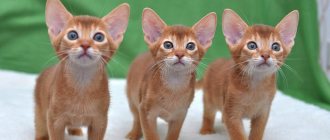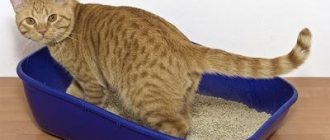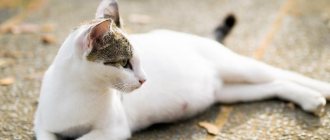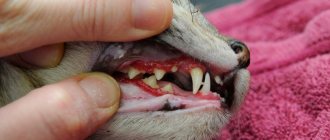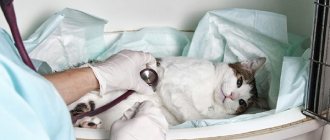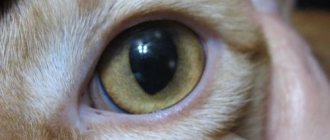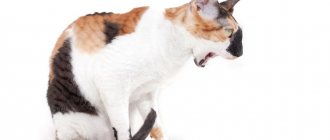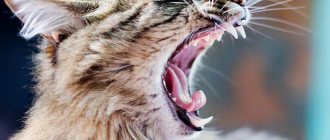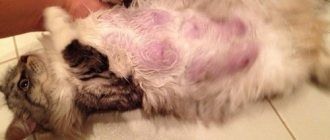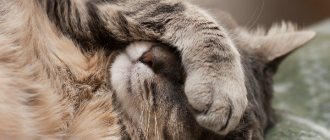If a cat that is expecting a litter becomes unwell, it causes great anxiety in the owner. Diarrhea in a cat before birth may be a symptom of its onset or a sign of a serious illness. It is important to know what factors can provoke stool disorder in a cat in order to provide timely assistance to the animal.
General information
Diarrhea is not a disease in itself, but only a symptom indicating some kind of pathology. Moreover, the latter can be anything from a mild eating disorder to cases of oncology. So any episode of loose stool in your pet needs to be dealt with separately, contacting a veterinarian at the slightest suspicion of something wrong.
However, there is no need to panic right away: many cats, as well as people, repeatedly suffer from bouts of acute diarrhea throughout their lives. By “acute” we mean sudden onset diarrhea . Note that episodic and rare cases of digestive disorders most often do not indicate anything serious, but there is still a certain probability, for example, of the presence of a malignant tumor in the animal’s intestines. It is impossible to determine something serious here “by eye”, and there are no rules here.
There is only one general recommendation - if the animal feels normal, plays and eats, there is no particular reason for alarm.
Rules of conduct for the first day of illness
If your pet has loose stools, you need to provide her with proper first aid and seek help from a veterinarian. The salvation of the expectant mother and her babies depends on how quickly they seek help from a veterinarian. Basic rules of behavior on the first day of illness:
- The cat needs to be put on a starvation diet.
- The animal should always have clean water in the required volume.
- The animal needs to be given activated carbon at the rate of 1 tablet per 10 kg of weight. The tablets are pre-diluted in water and injected with a syringe, from which the needle has previously been removed, into the animal’s mouth. When consuming activated carbon, you need to increase your water intake and reduce the amount of food.
You need to treat a pregnant cat with great attention, and in case of problems with stool, before making decisions, you need to consult a veterinarian, only he will be able to competently help both the expectant mother and her offspring.
- The cat needs to be put on a starvation diet.
- The animal should always have clean water in the required volume.
- The animal needs to be given activated carbon at the rate of 1 tablet per 10 kg of weight. The tablets are pre-diluted in water and injected with a syringe, from which the needle has previously been removed, into the animal’s mouth. When consuming activated carbon, you need to increase your water intake and reduce the amount of food.
Predisposing factors
A very common cause of “liquefied” feces in cats is a common eating disorder. This is especially true when the pet is fed... milk! Yes, yes, it is (in most cases) even harmful to cats, since the body of an adult animal, in principle, does not digest this product. Moreover, lactose intolerance is the “calling card” of almost all representatives of the cat family.
What happens when a cat drinks milk? Nothing good: since the animal’s digestive tract lacks the enzymes necessary to digest its components, the product begins to curdle. Soon the lumps of former milk begin to simply rot. When they enter the intestines, rich in microflora, from the stomach, the process accelerates several times. This doesn't lead to anything good.
In short, we would not recommend feeding a pregnant cat milk. Yes, it contains a lot of calcium, which is so necessary for future kittens, but the mother’s body still cannot absorb it. If there is such a need, it is better to compensate for its deficiency with the help of multivitamin preparations recommended by veterinarians. Of course, the list of all possible reasons is much longer:
- Food allergies and intolerance to some feed components.
- Parasitic and helminthic infestations .
- Malignant and benign tumors in the intestinal lumen.
- Viral, fungal or bacterial infections .
Separately, I would like to dwell on the quality of feed received by the animals. Believe me, the cat's body is very sensitive to poor nutrition! Never feed your pet stale food from the refrigerator. Such a diet will not only lead to diarrhea, but can subsequently cause, for example, cancer of the gastrointestinal tract.
If a pregnant cat has diarrhea in the later stages (or in the early stages, which is even worse) regularly, you need to consult a veterinarian, since this no longer looks like a normal digestive disorder.
Viral infections
Cats are susceptible to many viral infections. And almost all of them are accompanied by the development, including severe diarrhea.
The most common pathologies are:
- Feline panleukopenia (also called feline distemper).
- Leukemia (FeLV).
- Feline immunodeficiency virus (FIV).
- Feline coronavirus.
- Infectious peritonitis (FIP).
Unlike bacterial infections, viral infections in animals develop very quickly; suddenly, the pet’s body temperature increases very quickly. Let's look at the “parasitic” causes of diarrhea in pregnant cats.
Bacterial infections
Most often, uncontrollable diarrhea in animals is caused by: salmonella, pathogenic strains of E. Coli (common Escherichia coli), clostridia and campylobacter. Many of these pathogens are most often diagnosed in young cats, as well as in animals with weakened immune systems (and this can happen during pregnancy). These pathogens cause severe diarrhea, the animal completely loses its appetite, the pet becomes apathetic, a fever is possible, and the cat vomits. If nothing is done, death is possible.
Early birth
Diarrhea in a cat before giving birth, especially a few days before the start of the process, may be evidence of the body’s preparation. The absence of other signs of possible poisoning or infection indicates the beginning of the labor process. Before the birth itself, the body begins to prepare and cleanse itself in advance.
Physiological diarrhea is due to the fact that two weeks before the onset of labor, kittens begin to move closer to the exit, the uterus stops putting so much pressure on internal organs located high up - the lungs, stomach. But the pressure of the grown uterus on the lower intestines, on the contrary, increases. Don’t worry if your cat has diarrhea several times without affecting its general well-being.
We suggest you read: Why do cats' eyes fester?
A rise in high temperatures, frequent diarrhea, and the appearance of increased weakness in a cat are extremely dangerous for a pregnant animal, often leading to premature birth and non-viable offspring if not treated in a timely manner.
Parasitic diseases and diarrhea in pregnant cats
Coccidiosis
It is one of the most common pathologies of this type, and diarrhea is the main (often the only) one. With coccidiosis, blood and mucus almost always appear in the stool.
Interestingly, coccidia, the causative agent of the disease, can be found in the intestines of even a completely healthy cat. It’s just that her body effectively suppresses the pathogen, and therefore nothing bad happens. The problem is that during pregnancy your pet experiences severe stress. The process of bearing kittens is a huge stress for her body, and therefore the likelihood of a “breakdown” of the immune system increases markedly. In addition, during this same period, parasitic worms may become more active, which will also increase the risk of developing diarrhea and worsen the general condition of the pet.
Giardia
In the presence of these microscopic parasites, the cat develops profuse diarrhea, and the feces in this case are pale and have a “greasy” appearance.
But at first, the excreted feces will have a greenish or yellowish color. Note that the appearance of blood in them during giardiasis is a very bad sign. Not very characteristic signs of this disease are: gradually developing exhaustion, abdominal pain, and vomiting (due to severe intoxication).
Cryptosporidium
Cryptosporidium is the only protozoan capable of intracellular parasitism in cats. They are often the cause of episodic diarrhea in animals with weakened immune systems.
Parasites of the genus Tritrichomonas
Tritrichomonas are unique parasites. To begin with, the very fact of their presence in the body of cats was proven relatively recently. There is still no detailed description of the disease that occurs as a result of a cat being infected with these protozoa. In addition to diarrhea, inflammation of the animal’s anus is considered a relatively “characteristic” clinical sign.
Other diseases and pathologies
Let's consider other predisposing factors that often lead to diarrhea in pregnant (and not only) pets
- A sudden change in diet.
- Foreign bodies, including hairballs, in the gastrointestinal tract.
- Pancreatic insufficiency.
- Idiopathic inflammatory bowel disease (i.e. a pathology whose underlying cause remains unknown).
- Irritable bowel syndrome.
- Liver and kidney diseases (often aggravated in late pregnancy).
- Diabetes.
- Hyperthyroidism.
Thus, loose stools in a pregnant cat can be explained by many reasons.
If diarrhea persists for two days or more, you should definitely take your pet to the vet.
Maintenance and care of a pregnant pet
Care and maintenance of a pregnant cat has certain features:
- No medications, vitamins or mineral supplements should be given to a pregnant cat without permission from a veterinarian. Under no circumstances should you vaccinate or treat against worms and external parasites. During pregnancy, such procedures are fraught with poisoning and death of not only the fetus, but also the mother.
- Prevention of jumps and falls. During pregnancy, the cat should be protected from high jumps. Even an experienced breeder does not always know how long it takes for a cat to develop a belly. It depends on the breed, the number of fetuses, and the constitution of the mother. A pregnant female should be protected from falling and jumping until her belly appears.
- Isolation from other animals. When keeping several cats or other animals in the house, the pregnant female should be placed in an isolated room until giving birth. This will help avoid injuries, scratches, and bites.
- Home content. If before pregnancy the animal was allowed to walk outside, then at the first sign of an “interesting situation” the pet should be transferred to home mode. The street is not a place for an expectant mother. In the wild, a cat faces not only dangers in the form of injuries, but also an increased risk of poisoning and infectious diseases.
- Help with grooming. A pet's large belly is an obstacle to thorough toileting. At this time, the cat needs help with grooming. The animal should be combed regularly with a wide-toothed comb. The coat can be wiped with a damp cloth or napkin.
- Monitoring the behavior of the expectant mother. The behavior of a pregnant cat can differ dramatically from its normal state. Often silent pets become talkative when bearing offspring. There may be several reasons why a pregnant cat meows: from a banal change in temperament under the influence of hormones to serious health problems. The owner must closely monitor the animal and, if pathology is suspected, immediately show it to a specialist.
- Control over the nature of discharge. Particular attention should be paid to monitoring the cat's discharge from the external genitalia. The following symptoms may pose a danger:
- Brown discharge 30–40 days after mating may indicate placental abruption and fetal death.
- The reason why a pregnant cat has bleeding can be uterine rupture, frozen pregnancy, or miscarriage. In this case, urgent veterinary attention is required.
- Greenish discharge with a pungent unpleasant odor is a formidable symptom of fetal decomposition and intoxication of the mother’s body.
- Purulent discharge indicates the development of an inflammatory process.
- Control over the timing of gestation. An experienced breeder has an idea of how long the interesting position of a pet lasts. But he doesn’t always know what to do if a cat goes through pregnancy. This condition exhausts the animal, and there is a risk of giving birth to non-viable or dead kittens. Under no circumstances should you take any action on your own to stimulate labor. Only a veterinary specialist, after examining the animal and performing an ultrasound if necessary, can decide on the feasibility and necessity of inducing labor.
When should you visit a veterinarian immediately?
But it's not always worth waiting that long. If you observe at least one of the following symptoms in your pet, you need to urgently show it to a veterinarian, without putting it off “for later”:
- Fever.
- When you palpate the abdomen, the cat meows dissatisfied and hoarsely (this indicates a pain reaction).
- Copious amounts of blood in the stool. Bloody diarrhea in a pregnant cat is very, very bad!
- Apathetic state.
- Weight loss.
- Dehydration.
- Complete lack of appetite. It is worth noting here that immediately before giving birth, refusal to feed is quite normal.
- Disgusting odor from feces. Of course, in cats, in principle, they do not smell like violets, but with some diseases the “aroma” becomes completely intolerable.
- The animal is constantly pushing.
Visit to the veterinarian
Before breeding an animal, competent and responsible owners carry out a set of preventive measures to prevent health problems during pregnancy:
- vaccination against infectious diseases;
- deworming (treatment against worms);
- treatment against external parasites (fleas, lice, lice, etc.).
The owner can notice the first signs of pregnancy in his pet no earlier than the third week after mating with a cat. The cat's mammary glands turn pink, her belly becomes rounder, her appetite and behavior change. Vomiting, drowsiness, and frequent urination may occur. However, these signs are not clear in all animals. Some owners discover an interesting situation for their pet when the kittens of a pregnant cat begin to move. And this happens already 1 - 2 weeks before birth.
In addition to an ultrasound of the abdominal cavity, a veterinarian will conduct a clinical examination of the animal and, if necessary, prescribe a biochemical blood test. If the cat does not suffer from chronic diseases, then further observation by a doctor will not be required.
During a visit to the veterinary clinic, the owner can receive advice on feeding, care and maintenance of a pregnant pet in a particular case. If necessary, the animal will be prescribed vitamin and mineral supplements. They should be used strictly as recommended by a doctor.
What can you do at home?
Simple cases can be treated at home. The most correct thing is to put your pet on a starvation diet . Duration – no more than a day. In more complex cases, it is recommended to “put” your pet on a diet consisting of 50% boiled rice and another 50% boiled chicken. Never give your animal dairy products. If your pet's condition does not improve within two to three days, be sure to contact your veterinarian. In addition, do not overdo it with rice - if you feed it to your pet for a long time, she will probably develop severe constipation.
Be sure to ensure that the animal does not develop dehydration . The more severe the diarrhea, the more water his body loses. How do you know if this process has begun in your cat's body? Pretty simple - feel her gums. Sticky or dry, they may indicate dehydration. A healthy animal's gums should be firm, moist and smooth to the touch. You can simply squeeze the animal's skin into a pinch and quickly release it. If the cat's body is not dehydrated, the skin will almost immediately return to its previous appearance. Otherwise, we are talking about dehydration.
In addition, you should encourage your cat to drink more water. The easiest way to do this is to use liquid chicken broths (with a little salt added).
Main causes of symptoms
Vomiting and diarrhea in your mustachioed pet can be caused by a wide variety of conditions. These include acute poisoning, diseases or chronic processes in the body.
Below are the main reasons why a cat may vomit and vomit:
- Food poisoning, which develops as a result of eating low-quality or spoiled foods. Expired food and rotten meat can cause these symptoms.
- Poisoning by poison. It could be rat poison or chemicals. A cat can become poisoned by eating a mouse.
- Worm infestation. Helminths that parasitize the intestines can cause diarrhea.
- Acute or chronic pancreatitis (inflammation of the pancreas, develops as a result of poor diet). For example, after eating fatty meats or poultry. Pork and rich meat broths are strictly contraindicated for cats.
- Obstruction of the small or large intestine caused by ingestion of a foreign body. This could be a toy, a bag, an ear stick, cotton wool, etc.
- Oncological neoplasms, as a result of which severe intoxication develops. Tumors of the digestive tract can cause obstruction.
- Diseases of the digestive system (gastritis, peptic ulcer, colitis).
- Viral diseases in cats can also manifest as stool disturbances, nausea and vomiting.
- Acute renal failure, in which severe intoxication of the body develops.
- In a kitten, diarrhea and vomiting can be provoked by early weaning from breast milk. At one month he still needs breastfeeding, since his digestive system cannot digest food for adult animals. At two months, the kitten can be gradually switched to food.
Please note that occasional vomiting is normal for cats. With the help of vomiting, cats cleanse their stomachs of hair swallowed while washing. This process does not pose a risk to the health of the animal.
Clinical methods
Despite all of the above, the most effective treatment for diarrhea in a pregnant cat is in a well-equipped clinic. And even here there are difficulties. The fact is that many drugs simply cannot be given to pregnant animals. Therefore, they try to treat only the simplest cases with medication.
When you urgently need to stop diarrhea in a pregnant cat, but at the same time not harm her future offspring, you can use astringents (in the simplest version - a decoction of oak bark). Often you have to force them in, but the effect is worth it.
Fortunately, diarrhea is often just a consequence of indigestion. Probiotics will help cope with this pathology . If the problem is much more serious (oncology, for example), there are only two ways: either wait for the birth (after all, a cat is not a person, it does not carry for nine months), or induce premature birth, and only then treat the pet “seriously.” The second option is also suitable in cases where the cat has high breeding value. But still, a veterinarian should know what to do with a pregnant cat suffering from diarrhea!
The cat will give birth soon, the cause of diarrhea before childbirth
Diarrhea in the last week before the onset of labor may begin due to the body’s preparation for the upcoming labor. And if the cat behaves calmly, you are sure that she could not have been poisoned by anything, then there is no reason to worry about the health of the animal. The body cleanses itself before the birth process, which can occur very soon.
If the birth is soon, a pregnant cat usually refuses to eat, she may have diarrhea. Before the birth begins, she begins preparing the nest; for this she can carry soft rags and things to a certain place. Therefore, it is better for the owners to think about this in advance and prepare a “maternity house” in the form of a box or plastic box. Cover the bottom of the box or drawer with an old sheet, show the future mother-cat the place of future birth and encourage her to stay in the prepared “house”.
If the case is not severe, the pregnant cat should be on a therapeutic diet. To do this, prepare a disposable syringe without a needle and try to give the cat a five percent glucose solution. Diarrhea in this situation can be treated with phthalazole. To do this, divide the tablet into eight parts and give the animal one part about four times a day. You can use the advice of traditional medicine. A decoction made from chokeberry, oak bark, pomegranate skins, and rice water fastens well.
Treatment of cats and kittens for diarrhea at home
First of all, don't panic. You should especially not start worrying if the animal is vaccinated and has not come into contact with dubious feline personalities. We remember that the main thing is to assess the condition and find out the causes of diarrhea in a cat .
You should be aware that home treatment with proper nutrition may not be effective in serious cases. Such severe ailments require medical intervention. However, there are a number of medications that are effective in treating the symptoms of bowel disorders, some of which are used in human treatment.
Medicines and dosage for diarrhea in cats
Despite the extensive list of drugs that can help a meowing sufferer with an intestinal disorder, not all of them are recommended by specialists. Any medicine is not a panacea, and in difficult cases, eliminating symptoms is simply dangerous for the cat’s life.
Here is an approximate list of effective remedies for diarrhea in cats:
Enterofuril is an effective broad-spectrum antimicrobial drug. The medication does not disturb the intestinal flora, so the rapid effect of enterofuril does not carry with it any side effects for the intestines. The medicine is excellent in treating feline diarrhea if the cause is bacterial infections, but viral stool disorders can also be treated.
- The price for enterofuril varies from 270 to 350 rubles;
- The dosage of the suspension for adult cats is 100 milligrams. For kittens 5 times less;
- Give 2-3 times a day, 12 or 8 hours apart;
- If over the last 10-12 hours the signs of diarrhea disappear, then the drug is stopped;
Diarcan is a medicine that is dissolved in water and offered to the pet to drink or added to the food. If the situation does not improve within 5 days, the drug is discontinued, since the diarrhea is not due to infection. The dosage is strictly observed, half a cube for cats up to 5 kg and a cube over. There is an 8-hour break between doses. The drug costs about 500 rubles;
Furazolidone is an antimicrobial drug that is effective due to the fact that bacteria develop resistance to it poorly. Treatment of loose stools with this remedy should be prescribed by a doctor who will select the correct dosage regimen. Typically, the daily dose is divided into three parts, each third mixed with food. Furazolidone can be bought for an average of 100 rubles;
Bifidumbacterin is a probiotic that normalizes the functioning of the gastrointestinal tract. The product is sold in the form of tablets, powder and suppositories. Bifidumbacterin is indicated for long-term viral diseases of the cat and during a course of treatment with antibiotics. The cost of the probiotic depends on the dosage, but for cats the price will be approximately 100-200 rubles;
Smecta and activated carbon are enterosorbents that remove toxins from the gastrointestinal tract. If the bowel disorder does not last long, then the cat can be given smecta to drink. The price for smecta enterosorbent is 130-150 rubles;
Enterosgel is a drug that actively cleanses the cat’s body of toxins, helps with poisoning, intestinal infections and after antiparasitic treatment. It would be better if a specialist prescribes such a remedy for your pet, because it is important not only to relieve the symptoms of the disease, but also to find the cause.
Phthalazole is an antimicrobial medicine. Even salmonella is repelled from this medication. The remedy has been proven for weakening the intestines by more than one generation of mustaches. The tablet must be crushed, mixed with water and offered to the animal in a syringe. There are contraindications for use. The price of tablets is 30-40 rubles;
Loperamide - a tablet is a savior, but not a cure. The symptoms of diarrhea will disappear, but the cause will remain. Loperamide is excellent at removing bacteria and parasites from the body, but it is worth consulting with a qualified specialist. Loperamide costs 15-30 rubles;
Levomycetin is a strong drug that neither gram-positive nor gram-negative microorganisms can resist. Side effects will not appear if you follow the instructions and dosage. Otherwise, skin rashes, flatulence, and dermatitis may appear. The drug is contraindicated for pregnant cats or animals with kidney and liver diseases.
When to Call the Veterinarian
The occurrence of diarrhea in a pregnant cat in the last stages of gestation can be observed for a number of reasons, among which chronic diseases that were not initially treated often appear. Against the backdrop of increased stress on the body due to pregnancy, the body begins to fail, and ailments such as:
- diabetes;
- inflammation of the intestine of an idiopathic nature;
- pancreatic insufficiency;
- increased production of thyroid hormones;
- irritation in the large intestine; diseases of the liver and kidney structures.
It is necessary to call a veterinarian at home or take your cat to the clinic if the following characteristic symptoms of pathological conditions occur:
- the occurrence of febrile phenomena;
- abdominal pain when palpating the abdomen;
- the presence of blood fractions and clots in the feces;
- indifference to what is happening around;
- sudden weight loss;
- signs of dehydration;
- refusal to eat for a long period;
- fetid odor of feces of a putrid nature.
